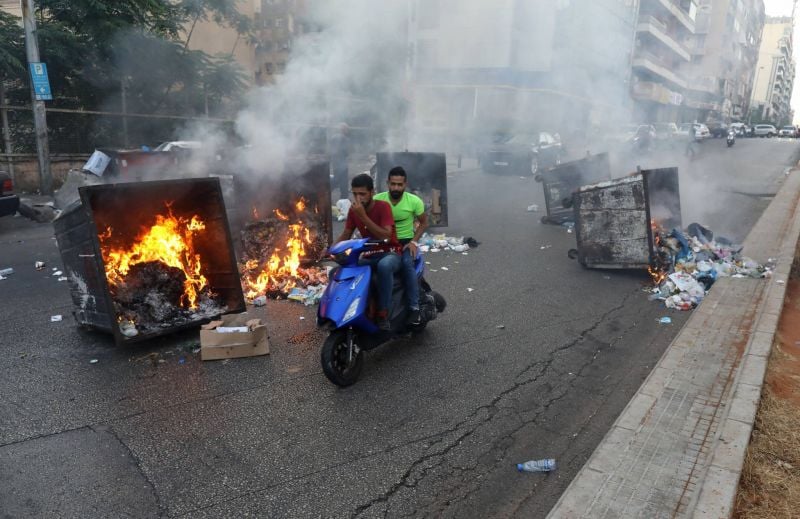
Two men ride past burning garbage bins during a protest at a main road in Beirut on Monday ahead of an expected fuel price hike (Credit: Marwan Tahtah/AFP) LEBANON-POLITICS-ECONOMY-DEMO-UNREST
BEIRUT — Worsening fuel shortages and the anticipation of an impending price hike on gasoline appeared to have pushed Lebanon to the brink of full-on collapse Monday, with one normally optimistic health official declaring that the country had reached “hell.”
The Ministry of Energy and Water is expected to set new fuel prices Tuesday, after Banque du Liban announced that it will no longer subsidize fuel imports at the official rate of about LL1,500 to the dollar, moving to a LL3,900 rate in a bid to preserve its shrinking foreign currency reserves.
While long lines at gas stations have become the norm, the crowding was worse than usual at the few that remained open Monday, with altercations breaking out between frustrated customers.
Meanwhile, protests and roadblocks erupted around the country, a major public hospital announced it had shut off its air conditioning to ration electricity, and banks announced they would close after three bank employees were reportedly injured in scuffles with a group of angry depositors who stormed the building.
Protestors blocked main roads throughout the day, including in Sur, Saida, Corniche al-Mazraa in Beirut and Barja in the Chouf. In Tripoli, protesters arrived with cranes to cut off the Abu Ali roundabout with cement blocks.
Lebanon’s once-thriving health care system has been hit especially hard by the shortage of foreign currency for imports.
In recent weeks, some hospitals have suspended elective procedures, labs have run out of test kits and physicians have warned that anesthetics for procedures may run out soon.
On Monday, Firass Abiad, the head of Rafik Hariri University Hospital, announced that due to protracted electricity cuts, RHUH is turning off air-conditioning throughout its premises except in areas needed for medical purposes such as operating and examination rooms. Abiad shared a letter to the Minister of Energy highlighting the difficulties the hospital is enduring amid 21-hour power outages that require it to rely heavily on generators.
“There is no need to use imagination or intimidation, we are really in hell,” Abiad wrote on Twitter.
Meanwhile, several state agencies were forced to suspend their services on Monday for lack of power or equipment. Due to electricity cuts, General Security’s software programs went down, which halted the processing of paperwork. As a result, processing of passports, residency permits, emergency documents and other services were suspended until further notice.
While restaurants and other food businesses have been struggling to keep their supplies refrigerated, the head of the Lebanese Poultry Syndicate warned Monday of a “massive disaster” due to electricity cuts, which could prove fatal for live chickens because of lack of air conditioning amid the current heatwave and ruin refrigerated chicken. He called on authorities to deliver diesel to chicken farms.
Amidst the worsening chaos, some have begun to take their anger out on the banks.
A group of depositors from the local NGO Banin Charity Association stormed the headquarters of Lebanese Swiss Bank in Beirut’s Hamra neighborhood on Monday afternoon to demand money transfers. A representative from the NGO said the transfers were needed to cover surgeries abroad for needy people.
Scores of unarmed people reportedly took part in the incursion, holding some bank employees inside as negotiations progressed.
Three of the Lebanese Swiss Bank’s employees were injured, according to a statement released by the bank on Monday night. Following this statement, the Association of Banks said that all commercial bank branches across Lebanon will close on Tuesday, in solidarity with the bank’s employees.